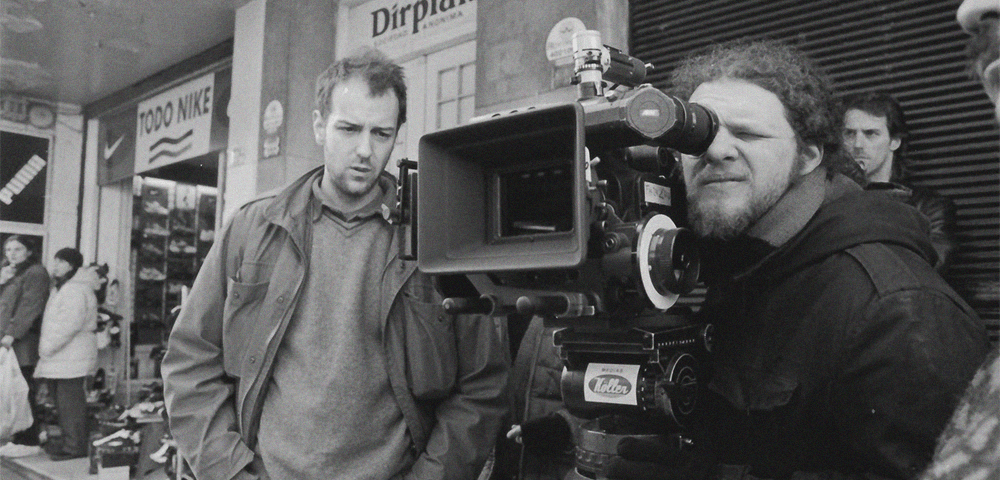
2024 marked two decades since the Cannes debut of WHISKY, a drolly melancholic comedy from Uruguayan writer-director duo Pablo Stoll and Juan Pablo Rebella. WHISKY combined a kind of shit-eating Beckettian existentialism with rigorously controlled filmmaking; while the movie took home an Un Certain Regard prize and was widely heralded as an important work of new Latin American cinema, Rebella sadly took his own life in 2006, at the untimely age of 32.
This spring, Spectacle is proud to host anniversary screenings of WHISKY as well as the earlier Stoll/Rebella comedy 25 WATTS (2001), and to spotlight two features Stoll made after his friend’s death. These films testify to a brilliant and idiosyncratic collaboration (and thus a great loss for cinema), as well as Stoll’s continued importance as an artist equally enamored of formal experimentation, film history, and the eternal comedy of being human.
Special thanks to Cinema Tropical, Lucía Malandro, Jesse Trussell, and Pablo Stoll.
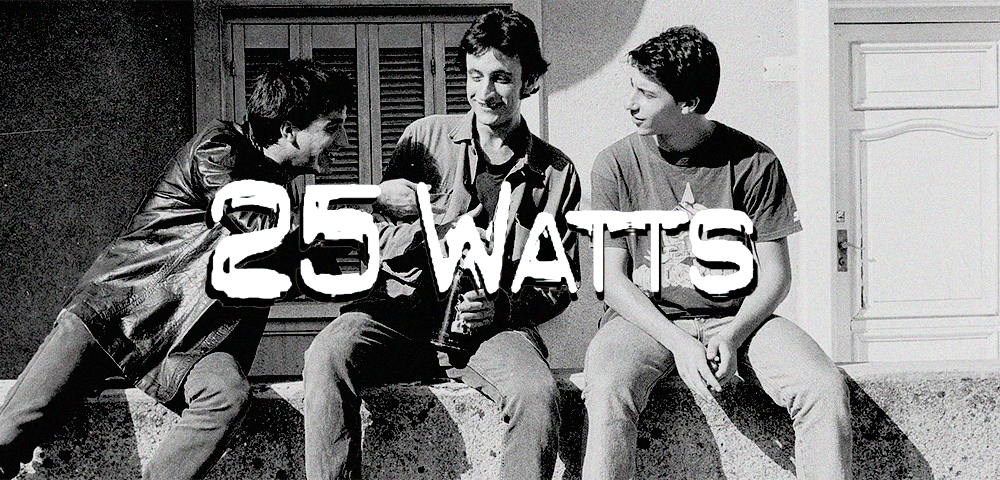
25 WATTS
dir. Pablo Stoll and Juan Pablo Rebella, 2001
Uruguay. 93 mins.
In Spanish with English subtitles.
TUESDAY, APRIL 8 – 7:30 PM
SATURDAY, APRIL 19 – 7:30 PM
TUESDAY, APRIL 22 – 10 PM
FRIDAY, APRIL 25 – 7:30 PM followed by remote Q+A with Pablo Stoll
(This event is $10.)
Un barrio. Tres pibes. Veinticuatro horas.
Stoll and Rebella’s breakout debut details the lives (or lack thereof) of a trio of teenage friends kicking rocks over a hungover and dissatisfied 24 hours in Montevideo.
Shot in arresting, high-contrast black and white film, 25 WATTS drew inevitable comparisons with CLERKS and LA HAINE. While it is often austere, Stoll and Rebella take conspicuous pleasure in brief digressions in style, like when the camera adopts the perspective of a spinning vinyl record or an 11th-hour flashback disrupts the sleepy narrative pace. Almost a quarter century later, 25 WATTS feels like a playful, even punkish antidote to the taxidermied mise-en-scene that came to dominate twee arthouse cinema in the 2000s.
While 25 WATTS was the most recognized film in Uruguayan history at the time of its festival run, the filmmakers were uncomfortable at the idea of representing a national cinema. Nevertheless, this is a precise portrait of a culture that doesn’t know quite what to do with its young men, resulting in a turn-of-the-millennium slacker comedy par excellence (and anticipating the even more bone-dry WHISKY).
“A very charming and funny derivation of the Jarmusch manner from Uruguay… The basic focus is on three hungover slackers one busy Saturday in Montevideo. I served on the jury for the Buenos Aires Festival of Independent Film that awarded its acting prize to the three likable leads (Daniel Hendler, Jorge Temponi, Alfonso Tort), and the film won many well-deserved festival prizes elsewhere (including a couple in Rotterdam.)”— Jonathan Rosenbaum
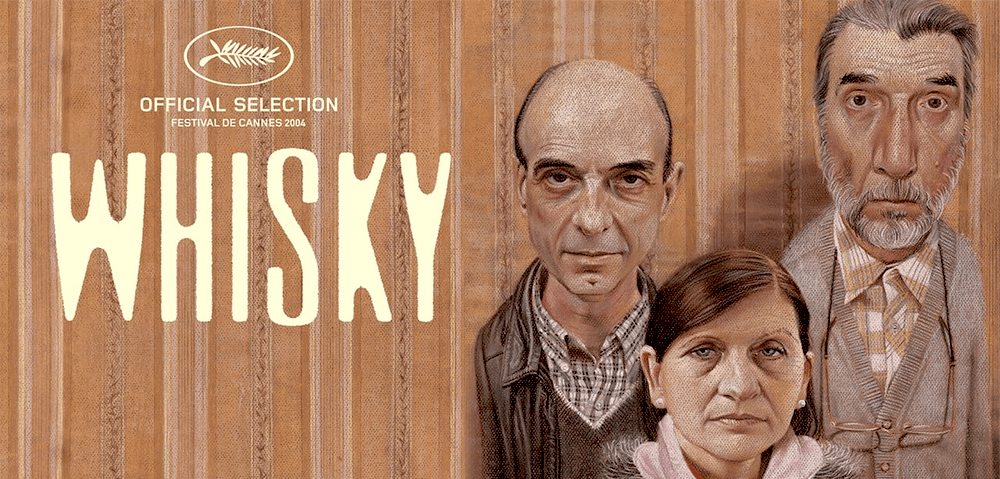
WHISKY
dir. Pablo Stoll and Juan Pablo Rebella, 2004
Uruguay. 94 mins.
In Spanish with English subtitles.
THURSDAY, APRIL 10 – 7:30 PM
THURSDAY, APRIL 17 – 7:30 PM
TUESDAY, APRIL 22 – 7:30 PM followed by remote Q+A with Pablo Stoll
(This event is $10.)
MONDAY, APRIL 28 – 10 PM
Stoll and Rebella did not return to the disaffected teenage milieu of 25 WATTS for their second feature, but instead pivoted into a tale of existential crisis past the point of midlife. 60-year-old Jacobo (Andrés Pazos) operates a sock factory in Montevideo. When his more successful older brother Herman (Jorge Belani) surprises him with a visit after years of estrangement, Jacobo can’t face the idea of him walking in on a life that is blatantly unsatisfying and a factory on the verge of shutting down. So Jacobo asks his employee Marta (Mirella Pascual) to pose as his wife for the weekend. A love triangle ensues.
Seen by many as the duo’s masterpiece, WHISKY is a beyond-deadpan family comedy of matters. It’s a barbed rumination on middle-class success that revels in negative emotional space. This even extends to the title, a reference to how Uruguayans say “Whisky!” the same way Americans say “Cheese!” when getting their pictures taken.
“Repeated near-Bressonian sequences track Jacobo as he opens the plant: shots of hands flipping switches and machines whirring to life establish a cinematic rhythm that propels the film through its first half… [WHISKY]’s neat bifurcation suggests a pair of filmmakers gradually becoming fascinated with larger questions of narrative structure.” — Jeff Reichert, Reverse Shot
“The story of two souls seemingly stuck in neutral (with a third in relentless drive), the film is a model of both fiscal and narrative economy, and the kind of work—gleaned from the mysteries of consciousness, telling quotidian details and a sense of aesthetic proportion—that is too often missing from American independent cinema.” — Manohla Dargis, The New York Times
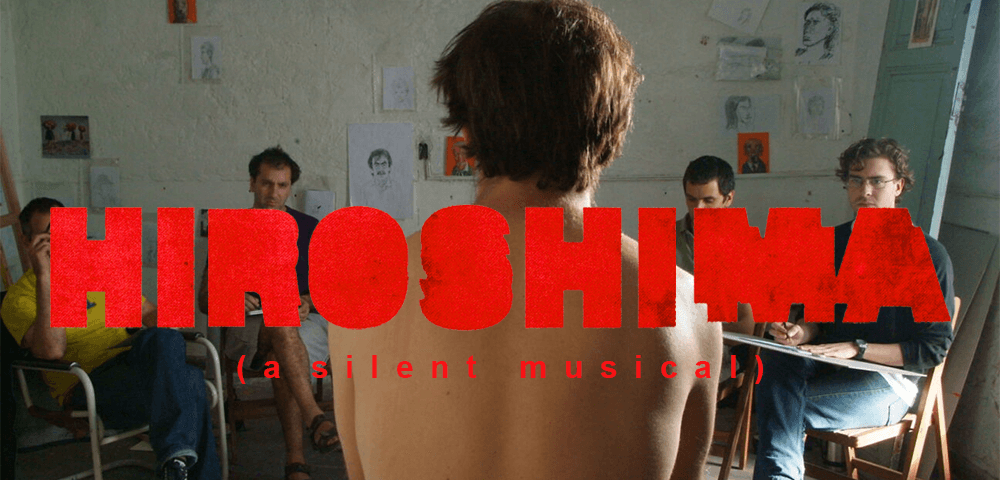
HIROSHIMA
dir. Pablo Stoll, 2009
Uruguay. 80 mins.
Silent with English intertitles.
WEDNESDAY, APRIL 2 – 7:30 PM
MONDAY, APRIL 7 – 7:30 PM
SATURDAY, APRIL 12 – 7:30 PM
FRIDAY, APRIL 18 – 10 PM
Like 25 WATTS, Stoll’s first solo credit as director takes place over the course of one 24-hour period. But it would be too easy to call HIROSHIMA a synthesis of that film’s slacker vibes and WHISKY’s mimetic tragicomedy, anchored by the filmmaker casting his real-life family—chiefly his brother Juan Andres Stoll as the protagonist, also named Juan. This Juan struggles to communicate with the people around him; Stoll subtracts human (and animal!) voices from the film’s equation, making HIROSHIMA a “silent musical.” The only audio is the music piped in through Juan’s discman as he makes his way from morning (working a joyless bakery gig) to night, where performing with his punk band The Genuflexes may offer an outlet.
While HIROSIHIMA does not explicitly reference Rebella’s death, its funereal atmosphere and trance state will resonate with anyone dumbstruck by grief. But Stoll’s film is also a game (and often hilarious) homage to pre-verbal cinema, using intertitles for spoken dialogue. This approach reveals a cinephilic love of experimentation wholly consistent with the earlier films, despite the almost neorealist trappings of the long takes and forlorn vistas, all building toward a payoff gag that must be seen to be believed.
“Actually nothing happens in this movie. But I was never bored throughout the screening. Makes me wonder…” — JvH48, IMDb
“…A wacky version of a certain kind of hybrid movie from cinema’s transition era from silence to sound, films in which sound was used expressively (even perversely) by the likes of Rene Clair and Alfred Hitchcock… We all see, a hundred times a week, examples of mainstream editing seamlessly, invisibly reinforcing the illusion of dialogue between characters, each of whom occupies his or her own close-up. By contrast, Stoll reminds us how dialogue was typically cut during the silent age, indistinguishable from visual force… HIROSHIMA is nothing less than trippy classicism.” — Tom Keough, The Seattle Times
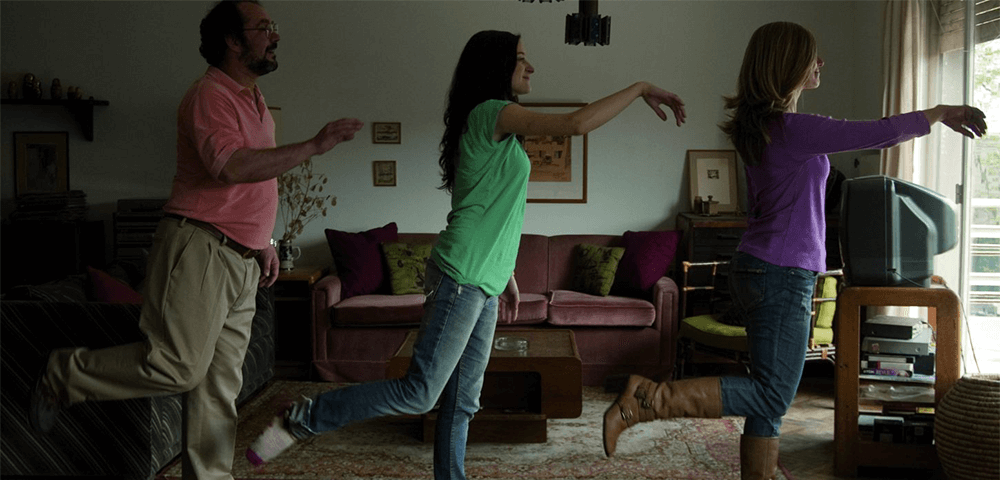
THREE
dir. Pablo Stoll, 2012
Uruguay. 115 mins.
In Spanish with English subtitles.
TUESDAY, APRIL 1 – 7:30 PM
THURSDAY, APRIL 9 – 7:30 PM
THURSDAY, APRIL 17 – 10 PM
MONDAY, APRIL 21 – 7:30 PM
Another acerbic portrait of human folly and repression, THREE was expanded from a treatment Stoll and Rebella worked on together, another comic grotesquerie of family dysfunction. Humberto de Vargas stars as Rudolfo, a floundering 40-something dentist who attempts to reconnect with his alienated ex-wife Graciela (Sara Bessio) and teenage daughter Ana (Anaclara Ferreyra Palfy), who forms the film’s emotional center of gravity. Rudolfo is dissatisfied with his new marriage, Graciela is focused on her dying mother, and the void of attention from her parents leaves Ana to seek it in the wrong places.
THREE feels very much like a melancholic (and realistic) take on the quirky family dramedies that dominated the 2010s and 2020s, mostly drawn in brief, episodic scenes that gesture toward a bigger scope than is warranted by the material. The combined tension and lightness of touch that made WHISKY feel like watching bugs squirm under a microscope is here, but Stoll’s acute melancholy is impossible to miss, and the filmmaker again uses music (this time, punk and indie tracks from Uruguayan bands) to chart queasy emotional landscapes.
“This film screams ‘Uruguayan’ in so many ways, at least the stereotypes conveyed in previous films by the duo Rebella/Stoll and subsequent movies that followed their style in the Uruguayan Wave that began in the 2000’s. Being released in 2012, technologically speaking it looks like it was shot some ten years earlier: plenty of tube tv’s, white CRT monitors, VHS players, etc… A great soundtrack by local bands, usually very underappreciated in the spanish-speaking world, let alone outside of it. Loved the stylish 1990’s football jerseys from Defensor and other smaller sides from their local league and abroad.” — jaibeseret, Letterboxd
